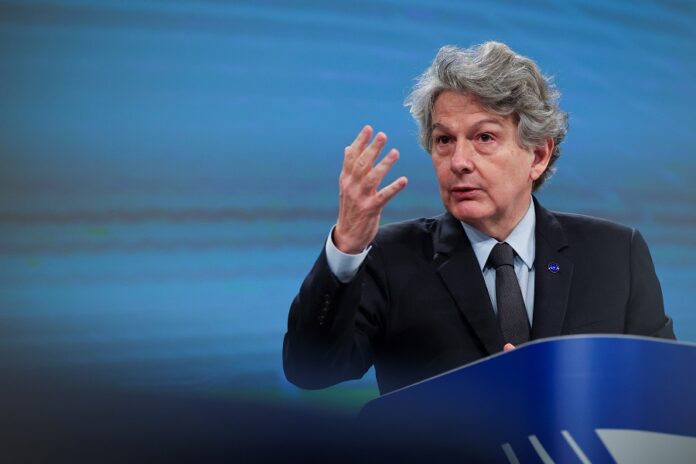Internal Market Commissioner Thierry Breton on Monday rebuked Germany for not doing enough to back common EU efforts to provide military aid to Ukraine, and instead focusing on sending bilateral support to Kyiv, according to Politico.
Breton, who is also in charge of defense, said Germany was less supportive of the EU’s European Peace Facility (EPF).
“Today we see that Germany is trying to go solo, it hasn’t fooled anyone, and in particular it is trying to stop supporting the European Peace Facility,” Breton told reporters in Paris.
The comment comes as Germany is publicly urging other member countries to boost their military supplies to Ukraine while privately questioning the way in which the European Peace Facility works. The facility is an off-budget mechanism for financing offshore EU military missions as well as aid to allies like Ukraine by reimbursing countries for military kit sent to Kyiv. Member countries pay contributions in proportion to their gross national income, making Germany the largest contributor, Politico reports.
Last month, Politico reported that a German confidential paper had laid out a proposal allowing countries to discount military aid provided to Ukraine from their contribution to the EPF, according to several diplomats from other member countries.
That works in Germany’s favor, as it is by far the largest European military donor to Ukraine. As of October 31, Germany had committed €17.1 billion in military aid to Ukraine since Russia’s February 2022 invasion, in second place worldwide after the U.S. France is a laggard, having offered €544 million — putting it in 15th place and well behind countries like Lithuania, according to the Kiel Institute Ukraine aid tracker.
Officials in Berlin have expressed frustration that the EPF is frequently used to reimburse EU countries for arms donations to Ukraine from their existing military stocks. Germany believes in particular that countries with larger defense industries such as France or Spain should instead focus more on placing new orders with their defense contractors to ramp up the production of new weapons and ammunition for Ukraine.
“For Ukraine it is decisive that military aid reaches it without delay,” a German diplomat in Brussels told Politico. “The EPF is useful, but can be blocked by a single Member State as has happened time and again in the past. Bilateral support is direct and quick and should be considered as an at least equivalent contribution.”
Military aid to Ukraine, along with adding €5 billion to the European Peace Facility, could be on the agenda of EU leaders when they meet for a special summit on February 1.
Commissioner Breton, who is from France, said the bloc should become less dependent on U.S. protection; Paris is also keen for European countries to buy weapons from European companies, and rely less on America.
Worry is growing in European capitals, however, about the reliability of American security promises with a $60 billion supplemental Ukrainian aid package remaining stalled in Congress due to resistance from some Republican Party lawmakers.
The unease has deepened on recent reports of comments made in 2020 at the World Economic Forum in Davos by then-U.S. President Donald Trump, to the effect that Washington would not fulfill its NATO pledges and come to Europe’s aid in the event of war. Breton was present at that Davos meeting with Trump.
Asked on Monday whether Europe should get ready to protect itself independently of the U.S. nuclear umbrella, Breton said: “All aspects [of defense] must be taken in consideration.”


